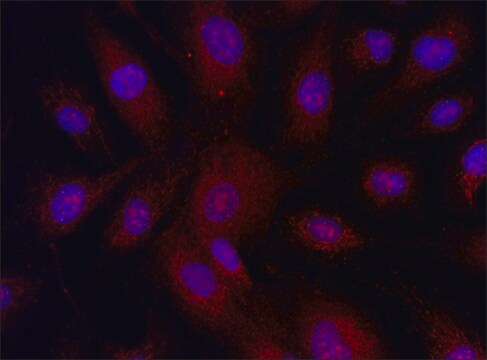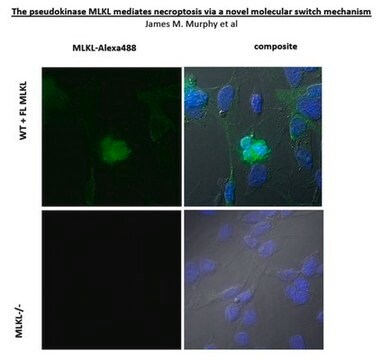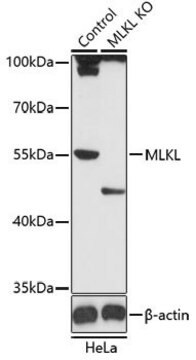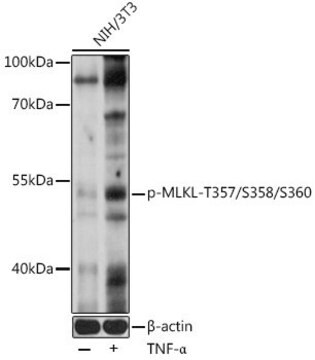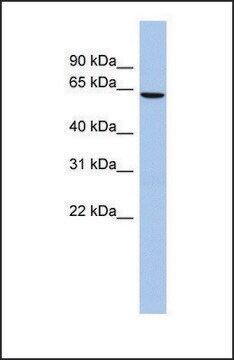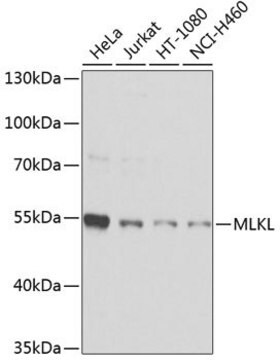SAB1408428
Anti-MLKL antibody produced in mouse
purified immunoglobulin, buffered aqueous solution
Synonym(s):
FLJ34389
Sign Into View Organizational & Contract Pricing
All Photos(3)
About This Item
UNSPSC Code:
12352203
NACRES:
NA.41
Recommended Products
biological source
mouse
Quality Level
conjugate
unconjugated
antibody form
purified immunoglobulin
antibody product type
primary antibodies
clone
polyclonal
form
buffered aqueous solution
mol wt
antigen ~54.5 kDa
species reactivity
human
technique(s)
indirect immunofluorescence: suitable
western blot: 1 μg/mL
NCBI accession no.
UniProt accession no.
shipped in
dry ice
storage temp.
−20°C
target post-translational modification
unmodified
Gene Information
human ... MLKL(197259)
General description
MLKL has a C-terminal pseudokinase (PsK) domain and an N-terminal 4-helix bundle (4HB) domain. Both these domains are held together by two brace helices.
The gene MLKL (mixed lineage kinase domain-like protein) is mapped to human chromosome 16q23. Activated MLKL is present at the cell membrane.
Immunogen
MLKL (NP_689862.1, 1 a.a. ~ 471 a.a) full-length human protein.
Sequence
MENLKHIITLGQVIHKRCEEMKYCKKQCRRLGHRVLGLIKPLEMLQDQGKRSVPSEKLTTAMNRFKAALEEANGEIEKFSNRSNICRFLTASQDKILFKDVNRKLSDVWKELSLLLQVEQRMPVSPISQGASWAQEDQQDADEDRRAFQMLRRDNEKIEASLRRLEINMKEIKETLRQYLPPKCMQEIPQEQIKEIKKEQLSGSPWILLRENEVSTLYKGEYHRAPVAIKVFKKLQAGSIAIVRQTFNKEIKTMKKFESPNILRIFGICIDETVTPPQFSIVMEYCELGTLRELLDREKDLTLGKRMVLVLGAARGLYRLHHSEAPELHGKIRSSNFLVTQGYQVKLAGFELRKTQTSMSLGTTREKTDRVKSTAYLSPQELEDVFYQYDVKSEIYSFGIVLWEIATGDIPFQGCNSEKIRKLVAVKRQQEPLGEDCPSELREIIDECRAHDPSVRPSVDEILKKLSTFSK
Sequence
MENLKHIITLGQVIHKRCEEMKYCKKQCRRLGHRVLGLIKPLEMLQDQGKRSVPSEKLTTAMNRFKAALEEANGEIEKFSNRSNICRFLTASQDKILFKDVNRKLSDVWKELSLLLQVEQRMPVSPISQGASWAQEDQQDADEDRRAFQMLRRDNEKIEASLRRLEINMKEIKETLRQYLPPKCMQEIPQEQIKEIKKEQLSGSPWILLRENEVSTLYKGEYHRAPVAIKVFKKLQAGSIAIVRQTFNKEIKTMKKFESPNILRIFGICIDETVTPPQFSIVMEYCELGTLRELLDREKDLTLGKRMVLVLGAARGLYRLHHSEAPELHGKIRSSNFLVTQGYQVKLAGFELRKTQTSMSLGTTREKTDRVKSTAYLSPQELEDVFYQYDVKSEIYSFGIVLWEIATGDIPFQGCNSEKIRKLVAVKRQQEPLGEDCPSELREIIDECRAHDPSVRPSVDEILKKLSTFSK
Application
Anti-MLKL antibody produced in mouse has been used in western blotting.
Biochem/physiol Actions
MLKL (mixed lineage kinase domain-like protein) primarily causes receptor-interacting protein (RIP) kinase–dependent necroptosis. However, during hepatitis, it results in programmed hepatocellular necrosis which is independent of RIPK3. MLKL also participates in endosomal trafficking and the formation of extracellular vesicle.
MLKL activation and subsequent N-terminal 4HB domain unleashing leads to oligomerization and cell membrane entry. This in turn leads to necroptosis.
Physical form
Solution in phosphate buffered saline, pH 7.4
Disclaimer
Unless otherwise stated in our catalog or other company documentation accompanying the product(s), our products are intended for research use only and are not to be used for any other purpose, which includes but is not limited to, unauthorized commercial uses, in vitro diagnostic uses, ex vivo or in vivo therapeutic uses or any type of consumption or application to humans or animals.
Not finding the right product?
Try our Product Selector Tool.
Storage Class Code
10 - Combustible liquids
WGK
WGK 1
Flash Point(F)
Not applicable
Flash Point(C)
Not applicable
Choose from one of the most recent versions:
Already Own This Product?
Find documentation for the products that you have recently purchased in the Document Library.
Depletion of RIPK3 or MLKL blocks TNF-driven necroptosis and switches towards a delayed RIPK1 kinase-dependent apoptosis.
Remijsen Q, et. al.
Cell Death & Disease, 5, e1004-e1004 (2014)
Understanding allosteric interactions in hMLKL protein that modulate necroptosis and its inhibition.
Nupur Bansal et al.
Scientific reports, 9(1), 16853-16853 (2019-11-16)
Mixed Lineage Kinase domain-Like (MLKL), a key player in necroptosis, is a multi-domain protein with an N-terminal 4 helical bundle (4HB) and a pseudokinase domain (PsK) connected by brace helices. Phosphorylation of PsK domain of MLKL is a key step
Kevin Puertas-Neyra et al.
Frontiers in neuroanatomy, 16, 812487-812487 (2022-03-01)
Retinal neurodegenerative diseases are the leading causes of visual impairment and irreversible blindness worldwide. Although the retinal response to injury remains closely similar between different retinal neurodegenerative diseases, available therapeutic alternatives are only palliative, too expensive, or very specific, such
Genetic changes associated with testicular cancer susceptibility.
Pyle LC and Nathanson KL
Seminars in Oncology, 43, 575-575 (2016)
The pseudokinase MLKL mediates programmed hepatocellular necrosis independently of RIPK3 during hepatitis.
Gunther C
The Journal of Clinical Investigation, 126, 4346-4346 (2016)
Our team of scientists has experience in all areas of research including Life Science, Material Science, Chemical Synthesis, Chromatography, Analytical and many others.
Contact Technical Service